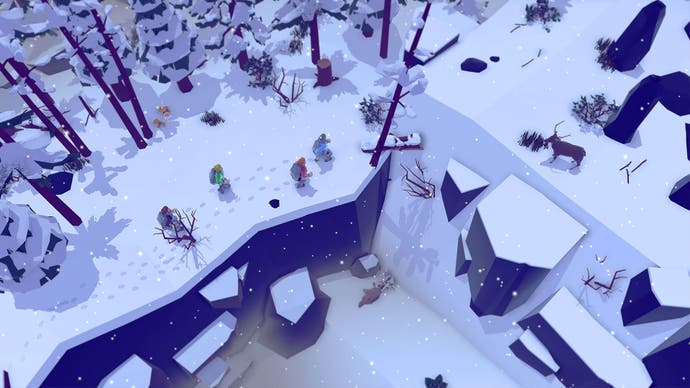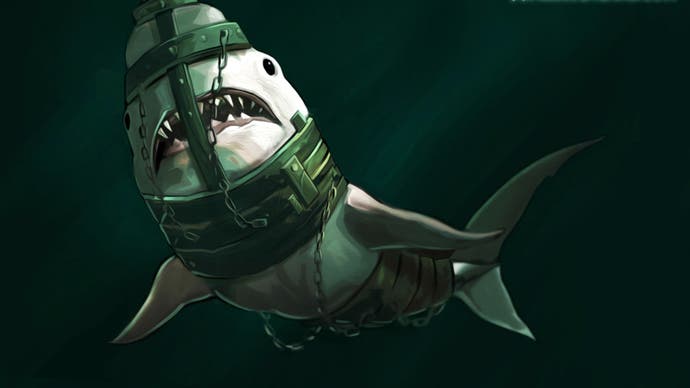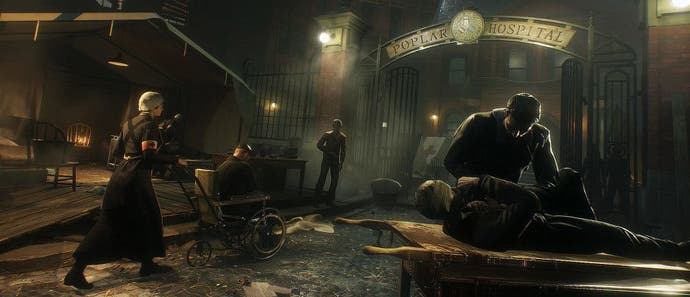Why are games so fascinated with cannibalism?
Unaccountably peckish.
There's a long inglorious tradition of cannibalism in video games, from the many flesh-eaters of the Dark Souls series through the "strange meats" of Fallout to the gaping cosmic horror that is Kirby. In the last few years, though, developers seem to have really acquired a taste for it. Take this spring's The Wild Eight - a survival game distinguished by some neat firelight effects and the preposterous, yet strangely persuasive option to eat the corpse of your previous self, providing you can find your way back to it after you respawn.
In the course of six hours with the game I must have tracked down and gobbled myself up a dozen times over - filling my belly with my own, me-saturated remains in a sort of finger-licking, Ray Mears-authored parody of Inception. It's a fairly sound survival strategy, up to a point: meat is hard to come by in The Wild Eight till you've crafted the right kind of stabby object, so there's no sense letting stray chunks of it go to waste whatever or rather, whoever they were in life. And in any case, you'll probably want to reclaim your precious gear from the site of your demise - just watch you aren't eaten by something else en-route.

Cannibalism also has its advantages in Sunless Sea, Failbetter's delightfully horrid naval exploration game. A ship is quite capable of operating with just one crew member, providing you don't mind limping along, which makes the rest of your valiant band something of a disposable resource, rich in essential vitamins and fibre. When you're miles from port, the gods are out to get you and you've run out of ghost crab/vampire bat to munch on, that little headcount indicator along the navbar starts to look awfully tempting. There's a price to pay, in the form of the permanent character trait "Unaccountably Peckish", but it's more of a twist in the tale than a penalty, as your unholy taint unlocks certain unsavoury opportunities on shore.
The lack of a real downside for turning cannibal has irked some Sunless Sea players, but it's small potatoes by comparison to some of the other dreadful things you can do in Sunless Sea, and besides, there's a historical precedent for the game's relaxed attitude. Lovecraft and Greek myth aside, Sunless Sea is based heavily on the misadventures of 19th century privateers, merchants and explorers, back when having to make a meal of your own bosun was viewed as - well, not exactly par for the course, but forgiveable in extreme circumstances.
I interviewed Failbetter's former writer (and Eurogamer contributor) Alexis Kennedy on the subject in 2015, and he brought up the case of Tom Dudley and Edwin Stephens, two sailors who killed and ate their 17-year-old cabin boy Richard Parker after losing their ship off the Cape of Good Hope. The pair were arrested and tried for murder after making it home, but for much of their trial, they enjoyed the support of the public - the victim's brother even shook hands with the perpetrators in court.

Set in World War-era London, Dontnod's forthcoming Vampyr takes a sterner tack than Sunless Sea, paying you back in subtle ways for each NPC you devour. As eminent physician and closet blood-sucker Jonathan Reid, you can drain the life from every resident you meet, unlocking a tidy array of spells and abilities in the process. The catch is that once consumed those characters are gone for good, so to dine out on them is basically to rip whole pages out of the story because you want to make more of a splash in combat.
I'm looking forward to sampling the full range of endgame scenarios, there - at one extreme, presumably, a London that bustles with life and a protagonist whose only hope of weathering a brawl is running in circles till everybody's knees give out. And at the other end of the possibility spectrum, a London whose streets are desolate save for a single, enormously fat vampire, belching quietly and fanning his face on a bench in Whitechapel. The idea, of course, is to pick your victims in order of ascending scrupulousness, chewing up the bad eggs while sparing the goodies (or at least, saving them till last), but perhaps you'd prefer to think of it as a more extreme form of script editing. Is this twinkling fop really contributing to the drama, or would they be more convincing as a sandwich? Is that Cockney sparra worthy of a proper character arc, or is he just a passing snack?
As to why cannibalism has become more of a theme of late - well, you could pin it on the absolute glut of vaguely Cormac-McCarthy-inspired survival games over the past few years, games in which picking your teeth with somebody's toe-bones is all part of the thrill of touring a wild frontier. But perhaps there's more to this than any particular game or series. Perhaps the surprising prevalence of cannibalism in video games reflects a furtive ambivalence about how we tend to guzzle our way through games at large.

As has been explored in any number of articles, many games today are essentially well-camouflaged, highly theatrical performances of consumption and expenditure, landscapes packed with things to corner, slay and process (i.e. digest) in return for power. Blockbuster open worlders especially are in thrall to the idea of grind, which is at heart a process of homogenisation: the rendering down of a realm's contents - be they flocks of NPC wildlife, stray questlines or random clumps of platinum - into gobbets of sweet, all-purpose XP or currency, to be lavished on upgrades and unlocks that, in turn, make you a more efficient harvester.
There's no real reason human flesh should be any less objectionable a resource than gold or ingredients for potions - it's all just noughts and ones, and if you're happy to execute a billion drug-runners without trial in Ghost Recon: Wildlands, chucking one or two onto the BBQ is surely no biggie. But nonetheless, cannibalism remains enough of a taboo in-game to give most players pause, going by forum chatter, and in that hesitancy lies a certain radical potential. If there are things in these worlds that can be eaten yet are deemed unfit for the palate, perhaps that's an opportunity to think twice about consumption more generally, to ask whether there are other, less industrialised and more exciting ways to keep a player occupied. I'm almost certainly over-reaching myself - I'm the guy who likened Kirby to a Lovecraft monster in my intro - but it's hopefully food for thought.









